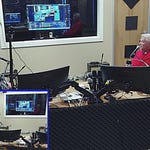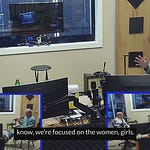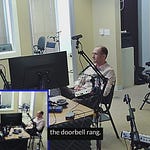Building on the inaugural podcast session with my daughter Lili Muskal (27), The conversation flowed naturally between personal updates, professional developments, social observations, and deeper reflections on generational differences. In this second podcast session with Lili, the conversation covered a mix of personal updates, career insights, technology, AI, storytelling, and reflections on societal trends. Lili shares her thoughts on AI's impact on jobs, the challenges of homeownership, intergenerational living, and the future of education. The discussion is engaging, humorous at times, and provides valuable perspectives on both personal and larger societal issues.
Key Topics Discussed:
Career and Professional Growth: Lili discussed her current work in healthcare policy after recently graduating from grad school. You both reflected on how internships have played a crucial role in her career path, noting that she's consistently worked at places where she had previously interned.
Living Situation and Housing Market: You discussed Lili's life in San Francisco, touching on the city's challenges with homelessness and high living costs. You had an interesting exchange about homeownership versus renting, with Lili noting many in her generation view homeownership as increasingly unattainable.
Intergenerational Living: You proposed the concept of intergenerational living arrangements as a potential solution to various societal problems, including elder care, childcare, and housing costs. Lili found this idea interesting but pointed out practical challenges.
Healthcare System Challenges: Given Lili's expertise in healthcare policy, you discussed the unsustainable nature of Medicare spending, the lack of state-level aging strategies, and the complicated structure of the healthcare system with many intermediaries.
AI and Future of Work: You shared your increasing dependence on AI for coding tasks, which led to a discussion about how AI might reshape the workforce. Lili expressed concern about younger workers potentially struggling to develop necessary skills if they rely too heavily on AI from the start.
Generational Differences: Throughout the conversation, you both noted differences between your generations, particularly regarding technology use, work expectations, and educational approaches.
Personal Updates: The conversation included personal elements about your shared life, with references to family friends and memories, creating a warm, authentic tone.
Top 5-10 Key Discussion Points:
Podcast Evolution & Guest Feedback:
Lili critiques the podcast’s progress, suggesting more guest diversity, outreach to niche longevity and science podcasts, and an audio-only version for easier consumption.
They discuss the format of long-form podcasts, editing, and structuring content for audience engagement.
Internships & Job Pipeline:
Lili highlights how internships are now the primary route to securing full-time jobs, even for experienced professionals.
They discuss whether all jobs should have an internship-like trial phase to align expectations between employees and employers.
AI's Role in Careers & Knowledge Work:
Lili acknowledges AI’s growing presence in health policy but believes that nuance, language precision, and constant change make human expertise essential.
Steve emphasizes that AI is a force multiplier, helping knowledge workers increase their productivity rather than replacing them outright.
They explore AI as a new kind of "worker" and how future professionals will need to become AI managers.
Homeownership vs. Renting & Economic Realities:
Lili shares that most of her peers are not pursuing homeownership in California due to high costs and complexity.
Steve discusses how homeownership as a wealth-building strategy may not be as beneficial as assumed, given ongoing expenses like property taxes and maintenance.
Intergenerational Living & Its Potential Benefits:
They discuss whether policies should incentivize intergenerational housing, potentially reducing costs for both child care and elder care.
Lili sees value in fostering multigenerational communities, but questions if people would want to care for others outside their family.
San Francisco’s State & Economic Divide:
Lili gives an update on SF, noting that while it remains a vibrant and valuable city, cost of living and social issues create stark divisions between "haves and have-nots."
They discuss how AI-driven shifts in Silicon Valley might further widen these economic disparities.
The Future of Education & AI's Role in Learning:
Steve and Lili debate whether AI should be fully integrated into education early on or if foundational skills must be learned first.
Lili supports AI-assisted learning but warns against overreliance, which could hinder deeper cognitive skills development.
Healthcare Costs & Policy Challenges:
They touch on the growing crisis of Medicare sustainability, aging populations, and inefficiencies in healthcare spending.
Steve questions whether intergenerational living could help alleviate some of these pressures.
AI Addiction & the Future of AI Pricing:
Steve admits he’s become “addicted” to AI tools for coding and knowledge work, worried that current pricing models are designed to hook users before increasing costs.
Lili shares recent developments in AI pricing, including OpenAI's new $2,000/month "AI knowledge worker" service, and they discuss the implications for professional industries.
Technology, Social Media & Society’s Attention Span Decline:
Lili sees social media addiction as a major issue, comparing it to smoking and advocating for stronger regulation, particularly for young users.
Steve argues that modern distractions have led to a decline in critical thinking and independent learning.
For a music clip - once again with a group (Andrew DeFaria, Jesse S Hose, Laurin Wilson, John Safarik, AlanW) never having played together as a group could engage and have fun. This was one of the first songs we tried. Most of us haven't played it before...Especially cool when we all aligned in the Ritadando.












Share this post